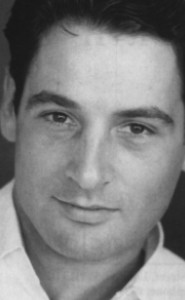 The
Detroit News
The
Detroit News
 The
Detroit News
The
Detroit News
"GRANT HIM THIS: 'EMMA' CO-STAR NORTHAM IS A BRIT OF A DIFFERENT HUE"
by Susan Stark, Film Critic, (c) 1996
Jeremy Northam joins Gwyneth Paltrow in the latest adaptation of a Jane Austen novel, "Emma." Jeremy Northam has his exit line for the American media down pat. It's worth reporting first.
"And no, I do not want to be the next Hugh Grant," he says tartly. "There are better parts to play."
Tall, dark and handsome, Northam is also smart, calm and confident. Because he is English and because his two most important film roles have cast him as a romantic lead, that "next Hugh Grant" business plagues him as he makes the rounds to promote Emma, opening Friday. In that film, the third major movie from a Jane Austen novel in a year, he's paired with Gwyneth Paltrow.
Last year in The Net, he was paired with Sandra Bullock. After just five minutes in Northam's company during his recent stop in Detroit, it's clear that he has nothing more in common with Grant than his citizenship and his good looks. Grant's all-purpose mode is irony. Northam uses it sparingly. Grant's sartorial style is a bit starchy: blue blazer, crisp shirt, conservative tie. Northam shows up in baggy cotton pants and a T-shirt topped by an unconstructed jacket. During interviews, Grant works hard at projecting an airily upper-crust image; at being "posh," one of his favorite words. Northam treats interviews as conversation, nothing more and nothing less; he's at ease with himself, if understandably bristly in the face of continuing comparisons to Grant.
"I don't expect it or wish for it," he says of the prospect of celebrity status. "I didn't get into this business for fame and fortune and an easy life. I do it because I like acting." Northam lets that thought settle a bit, smiles wanly and, as if to underscore the homeliness of his lifestyle, momentarily lapses into a working-class accent: "I lead me own life."
"I've never been recognized trudging off to buy the paper in the morning, and I hope that will never happen." In a more serious vein, Northam quite eloquently pinpoints the perils of success in the profession he has chosen: "In terms of the way it takes up your time and your essential personality, I can imagine that success could cause some kind of existential panic: 'Who am I?' Because you have no time to do the things you need to do to be yourself."
The fourth and youngest child of teachers, Northam was born in the ancient university town of Cambridge and raised in Bristol. He majored in English at London University and got his professional training at Bristol's esteemed Old Vic Theatre School. At 34, Northam has several theatrical and TV films to his credit, but the bulk of his experience has been on stage. That's typical of the training British actors bring to American movies, if and when Hollywood calls. It's also the basis for a somewhat snobbish but widely held view that the Brits have far more technical range than their American counterparts, who often come to movies on the basis of good looks alone. Northam begs to differ.
"Technique is what you do when you do what you do," he says edgily. "That is to say, everyone has technique. But I do think there's a difference in background experience between British and American actors. British actors have been trained predominantly on the stage. But between when I was training and now, that's changing because theater in the U.K. is changing. It's getting smaller. Someone like Gwyneth, for instance, has done both theater and film work. But most American actors come to the camera with almost a second sense of what it's about. Put it this way: In 10 years, I've done six feature films and a lot of TV films. Gwyneth has done eight features in two years and she's 23."
Northam says he was spotted for a role in Emma during his time in Los Angeles working on The Net. He plays Mr. Knightley, the heroine's reserved friend and counselor who finally shows his heart near film's end. Northam says the character's reticence, not a trait often seen in romantic leading men, is what caught his eye. Generally he views filmdom's current love affair with Jane Austen, well over a century after the fact, as the happiest of eventualities.
"Hers is an age of innocence, compared to ours," he muses. "And Austen's are indeed very romantic stories, written by a young woman projecting her future. But that's coupled with Austen's acerbic wit and almost cynical view of people. In other words, she encourages us to delve beneath the surface, to not trust the surface of things, and I think that appeals to our hard-headedness. It's not that we're cynical but, well, look at the way we look at our politicians. We're skeptical. So is Austen. And I think when romance flourishes in that sort of environment, it is truly romantic because it embraces human nature, warts and all."
It's Northam's preference for warts-and-all characters that puts final punctuation on his claim to a professional identity well apart from that of Hugh Grant. Lumping together the two actors may be convenient, but by the time Northam has done speaking a bit of his piece, he hardly has to proclaim his displeasure at being tagged "the next Hugh Grant." One does warts, the other doesn't. And that makes all the difference.